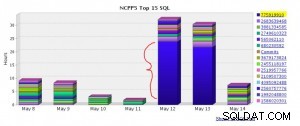Un tel critère de recherche ne pourra utiliser aucun index, mais c'est possible...
SELECT
*
FROM
yourTable
WHERE
N-M <= CASE WHEN yourTable.field1 = searchValue1 THEN 1 ELSE 0 END
+ CASE WHEN yourTable.field2 = searchValue2 THEN 1 ELSE 0 END
+ CASE WHEN yourTable.field3 = searchValue3 THEN 1 ELSE 0 END
...
+ CASE WHEN yourTable.fieldN = searchValueN THEN 1 ELSE 0 END
De même, si votre critère de recherche se trouve dans une autre table...
SELECT
*
FROM
yourTable
INNER JOIN
search
ON N-M <= CASE WHEN yourTable.field1 = search.field1 THEN 1 ELSE 0 END
+ CASE WHEN yourTable.field2 = search.field2 THEN 1 ELSE 0 END
+ CASE WHEN yourTable.field3 = search.field3 THEN 1 ELSE 0 END
...
+ CASE WHEN yourTable.fieldN = search.fieldN THEN 1 ELSE 0 END
(Vous devez remplir la valeur de N-M vous-même)
MODIF :
Une approche plus longue, qui peut faire certains utilisation des index...
SELECT
id, -- your table would need to have a primary key / identity column
MAX(field1) AS field1,
MAX(field2) AS field2,
MAX(field3) AS field3,
...
MAX(fieldN) AS fieldN
FROM
(
SELECT * FROM yourTable WHERE field1 = searchValue1
UNION ALL
SELECT * FROM yourTable WHERE field2 = searchValue2
UNION ALL
SELECT * FROM yourTable WHERE field3 = searchValue3
...
SELECT * FROM yourTable WHERE fieldN = searchValueN
)
AS unioned_seeks
GROUP BY
id
HAVING
COUNT(*) >= N-M
Où vous avez un index sur chaque champ individuellement, et où vous vous attendez à un nombre relativement faible de correspondances pour chaque champ, cela pourrait surpasser la première option, au détriment d'un code très répétitif.




